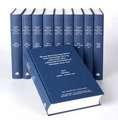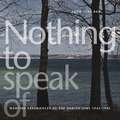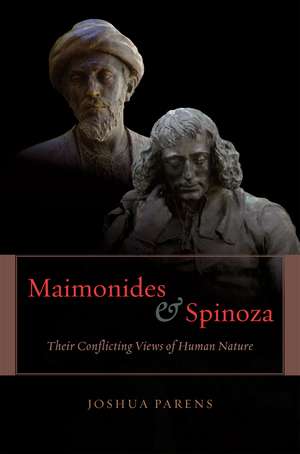Maimonides and Spinoza: Their Conflicting Views of Human Nature: Emersion: Emergent Village resources for communities of faith
Autor Joshua Parensen Limba Engleză Hardback – aug 2012
Turning the focus from Spinoza’s oft-analyzed Theologico-Political Treatise, this book has at its heart a nuanced analysis of his theory of human nature in the Ethics. Viewing this work in contrast to Maimonides’s Guide of the Perplexed, it makes clear that Spinoza can no longer be thought of as the founder of modern Jewish identity, nor should Maimonides be thought of as having paved the way for a modern secular worldview. Maimonides and Spinoza dramatically revises our understanding of both philosophers.
Din seria Emersion: Emergent Village resources for communities of faith
-
 Preț: 273.93 lei
Preț: 273.93 lei - 8%
 Preț: 311.68 lei
Preț: 311.68 lei -
 Preț: 138.81 lei
Preț: 138.81 lei -
 Preț: 115.82 lei
Preț: 115.82 lei -
 Preț: 144.80 lei
Preț: 144.80 lei -
 Preț: 185.37 lei
Preț: 185.37 lei -
 Preț: 161.27 lei
Preț: 161.27 lei -
 Preț: 548.71 lei
Preț: 548.71 lei -
 Preț: 208.31 lei
Preț: 208.31 lei - 18%
 Preț: 348.59 lei
Preț: 348.59 lei -
 Preț: 128.69 lei
Preț: 128.69 lei -
 Preț: 182.98 lei
Preț: 182.98 lei -
 Preț: 216.89 lei
Preț: 216.89 lei - 18%
 Preț: 2261.34 lei
Preț: 2261.34 lei - 8%
 Preț: 563.24 lei
Preț: 563.24 lei -
 Preț: 106.35 lei
Preț: 106.35 lei -
 Preț: 183.89 lei
Preț: 183.89 lei -
 Preț: 229.92 lei
Preț: 229.92 lei - 9%
 Preț: 352.77 lei
Preț: 352.77 lei - 8%
 Preț: 360.28 lei
Preț: 360.28 lei - 9%
 Preț: 353.24 lei
Preț: 353.24 lei -
 Preț: 126.25 lei
Preț: 126.25 lei -
 Preț: 94.22 lei
Preț: 94.22 lei -
 Preț: 176.49 lei
Preț: 176.49 lei -
 Preț: 302.76 lei
Preț: 302.76 lei -
 Preț: 146.50 lei
Preț: 146.50 lei - 8%
 Preț: 564.99 lei
Preț: 564.99 lei -
 Preț: 67.35 lei
Preț: 67.35 lei -
 Preț: 215.51 lei
Preț: 215.51 lei -
 Preț: 138.26 lei
Preț: 138.26 lei -
 Preț: 144.99 lei
Preț: 144.99 lei -
 Preț: 279.55 lei
Preț: 279.55 lei -
 Preț: 156.84 lei
Preț: 156.84 lei - 18%
 Preț: 502.35 lei
Preț: 502.35 lei -
 Preț: 179.04 lei
Preț: 179.04 lei -
 Preț: 167.85 lei
Preț: 167.85 lei -
 Preț: 115.53 lei
Preț: 115.53 lei -
 Preț: 160.63 lei
Preț: 160.63 lei -
 Preț: 307.53 lei
Preț: 307.53 lei - 12%
 Preț: 290.56 lei
Preț: 290.56 lei - 9%
 Preț: 352.50 lei
Preț: 352.50 lei -
 Preț: 208.54 lei
Preț: 208.54 lei - 8%
 Preț: 346.31 lei
Preț: 346.31 lei - 6%
 Preț: 324.95 lei
Preț: 324.95 lei -
 Preț: 125.41 lei
Preț: 125.41 lei -
 Preț: 120.81 lei
Preț: 120.81 lei -
 Preț: 133.99 lei
Preț: 133.99 lei -
 Preț: 101.43 lei
Preț: 101.43 lei -
 Preț: 92.35 lei
Preț: 92.35 lei -
 Preț: 163.52 lei
Preț: 163.52 lei
Preț: 269.30 lei
Preț vechi: 312.10 lei
-14% Nou
Puncte Express: 404
Preț estimativ în valută:
51.53€ • 53.94$ • 42.89£
51.53€ • 53.94$ • 42.89£
Carte indisponibilă temporar
Doresc să fiu notificat când acest titlu va fi disponibil:
Se trimite...
Preluare comenzi: 021 569.72.76
Specificații
ISBN-13: 9780226645742
ISBN-10: 0226645746
Pagini: 240
Dimensiuni: 152 x 229 x 38 mm
Greutate: 0.51 kg
Editura: University of Chicago Press
Colecția University of Chicago Press
Seria Emersion: Emergent Village resources for communities of faith
ISBN-10: 0226645746
Pagini: 240
Dimensiuni: 152 x 229 x 38 mm
Greutate: 0.51 kg
Editura: University of Chicago Press
Colecția University of Chicago Press
Seria Emersion: Emergent Village resources for communities of faith
Notă biografică
Joshua Parens is professor in and graduate director of the Department of Philosophy at the University of Dallas. He is the author of An Islamic Philosophy of Virtuous Religions and coeditor of the second edition of Medieval Political Philosophy: A Sourcebook.
Cuprins
Introduction
Chapter 1. Desire (Shahwa) and Spiritedness (Ghadab) vs. Conatus
Chapter 2. Veneration vs. Equality
Chapter 3. Forms vs. Laws of Nature
Chapter 4. Freedom vs. Determinism
Chapter 5. Teleology vs. Imagined Ideal
Chapter 6. Prudence vs. Imagination
Epilogue
Appendix: Richard Kennington’s Spinoza and Esotericism in Spinoza’s Thought
Index
Recenzii
“Joshua Parens’s illuminating study of Maimonides and Spinoza highlights the significant philosophical differences between the two thinkers through a distinctive focus on their conflicting views of human nature. Standing at the intersection between two fundamental problems—the relation between philosophy and religion, on the one hand; ancients and moderns, on the other—this book makes an important contribution to our understanding of each.”
“A well-conceived, well-executed thinking through of a tangled controversy over how to understand the relationship between two formidable and influential figures in the history of philosophy. Joshua Parens is thoroughly convincing in his assertion that the current scholarly tendency to assimilate Maimonides to Spinoza is superficially attractive but fundamentally misleading.”
“Joshua Parens argues persuasively that the time has come to expose Spinoza’s teaching and to engage in a more frank reckoning between the ancients and the moderns. Maimonides and Spinoza reflects the highest level of scholarship and will likely challenge scholars of both liberal Judaism and Jewish studies—the former for revealing Spinoza’s debt to Machiavelli and the latter for undermining hasty and ill-founded generalizations about philosophy and revelation.”
"The names Maimonides and Spinoza conjure up all sorts of images befitting their stature as world class philosophers. Maimonides is considered by most as the defender of Judaism while Spinoza was looked upon as one of its opponents. For the average nonspecialist, the arguments over whether Maimonides or Spinoza was the first modern philosopher or premodern philosopher or if Spinoza was still a medievalist may not be exciting, but among philosophers it is quite significant. . . . Parens focuses on Spinoza’s Ethics. By studying his theory of human nature and contrasting it to Maimonides’ Guide, he demonstrates that neither Spinoza nor Maimonides should be considered a premodern or modern. This study enhances our understanding of both philosophers and challenges the way of thinking about them that has been accepted for the past century."
